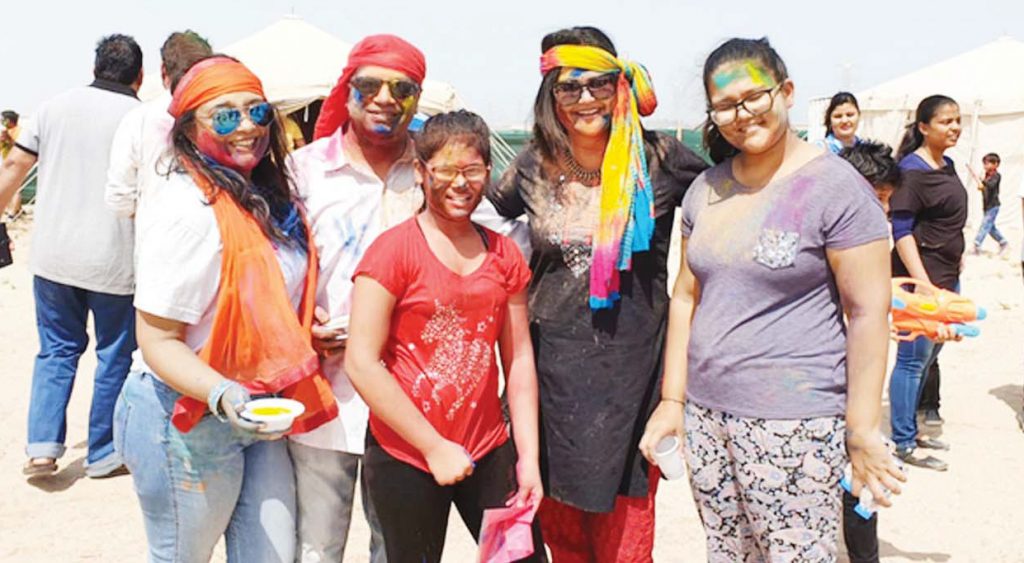29/03/2021
29/03/2021
Pandemic robs fun and frivolity from colorful festival
‘Holi’- The Festival of Colours is one of India’s most ancient festivals that marks the transition of nature and the advent of spring. It is a festival replete with symbolism, symbolising new beginnings, renewed hopes, a new harvest and a reaffirmation of love. In some parts of India, Holi also celebrates the start of a New Year. But like all festivals celebrated in the pandemic, Holi too has lost its colour and verve. On March 28 and 29, Indians will celebrate their second Holi in the pandemic. In India, state governments have issued directives to restrict celebration in public. Indians have been asked to observe a low key Holi at home.

Of all the Indian festivals, Holi is the most colourful and celebrated across India and the diaspora. Holi is celebrated differently in different parts of India, but the spirit, enthusiasm and colours remain the same. Like most Hindu festivals, Holi has ancient origins, and it symbolises the triumph of good over evil. Mythology associated with this festival reaffirms the power of ‘truth’ and ‘good’ over ‘evil’. Interestingly, despite its religious roots, there is not much religious activity involved in its celebration. “It is a harvest festival, which celebrates that time of the year when the farmers await the new harvest,” says Atul Gupta, a resident of Salmiya. “Harvest is a time to rejoice and celebrate.” Holi is also linked to Lord Krishna, the transcendental Supreme Person in Hinduism and his love for his consort ‘Radha’.
In India, the celebration of this festival cuts across regional and religious borders. Colour filled balloons and squirt guns drench all in the Holi spirit. Historical records indicate the celebration of this festival across different religions in India. Bahadur Shah Zafar, the last Mughal Emperor, whose Holi ‘phags’ (songs) are enjoyed even today, had his forehead tinged with ‘gulal’ colour by his Hindu ministers. During the rule of Shahjehan, Holi was known as Eid e Gulabi (Pink Eid) due to its carnival spirit. Today, when India’s various religious communities rejoice together and say ‘Holi Hai’, it is a tribute to India’s multihued culture, whose roots go back a long way. Holi celebrations mean doing away with inhibitions, disregarding polite societal norms, splaying one another with coloured powder and water and indulging in merrymaking. “The celebration goes on for two days in most of the states that celebrate,” says Rahul Srivastav, an IT professional. “On the evening of the first day, public bonfires commemorating the burning of Holika, a demoness are held. The bonfire symbolises the destruction of evil. The next day, the more enjoyable and recognisable ritual of splashing and throwing of colours take place.”
Restricted
The festival is an excuse for celebrants to shed their inhibitions and enjoy a day of fun. “India goes quite crazy during Holi,” says 18-year-old Rishab Thakur. “A couple of years back, I was in Delhi. I saw people on the streets laughing, shouting, chasing each other, throwing colour and dunking each other in tubs of colour.” This year, Holi will be subdued without its usual fun and frivolity. With the virus looming large in most parts of the world, the festival will be restricted to immediate family members. In the past, Hindus in Kuwait have celebrated Holi with enthusiasm. “Usually Holi celebrations are muted in Kuwait. It is nothing compared to how we celebrate back home, but we usually make the best of what we have,” says Ritika Patil, a homemaker in Kuwait. “Indian sweet shops sell traditional Indian sweets during this time. Most people play colours in the lobbies of their buildings, and the evenings are spent in get-togethers.”
Avinav Sharma, an entrepreneur, agrees that celebrations are different in Kuwait, but living by the rules is important. “According to Hindu mythology, Holi symbolises the regeneration of new life. To me, the basic message of Holi is to embrace all that is good and leave bad memories behind,” he says. “Holi has always been about meeting up with friends and family, eating gujiyas and having fun together by smearing each other with colours and playing with water,” says Ritu Nath, a company executive. “But due to the pandemic, none of this is possible. Everyone wants to avoid gatherings, and no one wants to apply colour to one another. It just doesn’t feel festive. I hope that by next Holi, we will be able to celebrate the festival with all its fun and vibrancy.”
Shalini Kabra, an investment accountant in Kuwait, hopes the festival will bring hearts closer despite the social distancing. “Holi is the festival of colours, emotions, and happiness,” she says. “Given the present circumstances of the pandemic, it is beyond doubt that Holi can not be celebrated with the usual breezy, carefree spirit. Coronavirus has forced the festival of colours to be “colourless”. In this year’s Holi, faces will not be masked with colours but with face masks. I hope the festival still brings hearts closer despite the physical distancing.” Dr Surendra Nayak, a doctor in Kuwait, urges caution and social distancing. “Since Feb 2020, Covid 19 has compelled us to celebrate all festivals quietly. I plan to celebrate Holi with family members. We must strictly obey public health norms. The sweets, colours and festivity must be restricted to indoors only.”
By Chaitali B. Roy Special to the Arab Times


